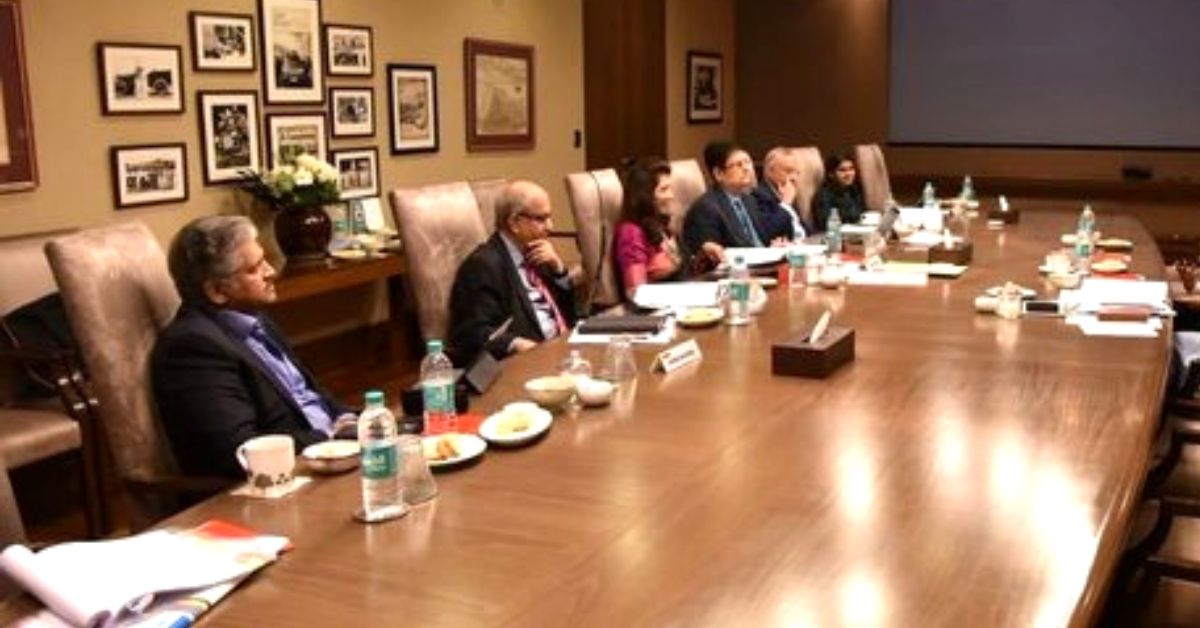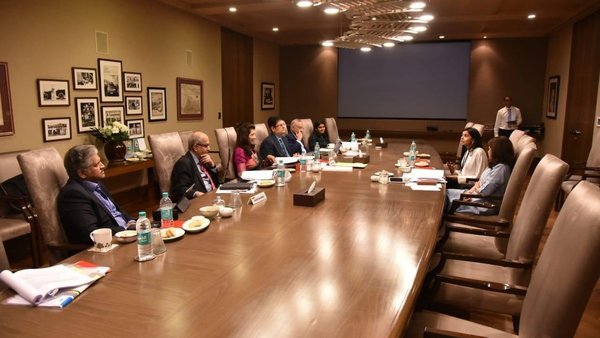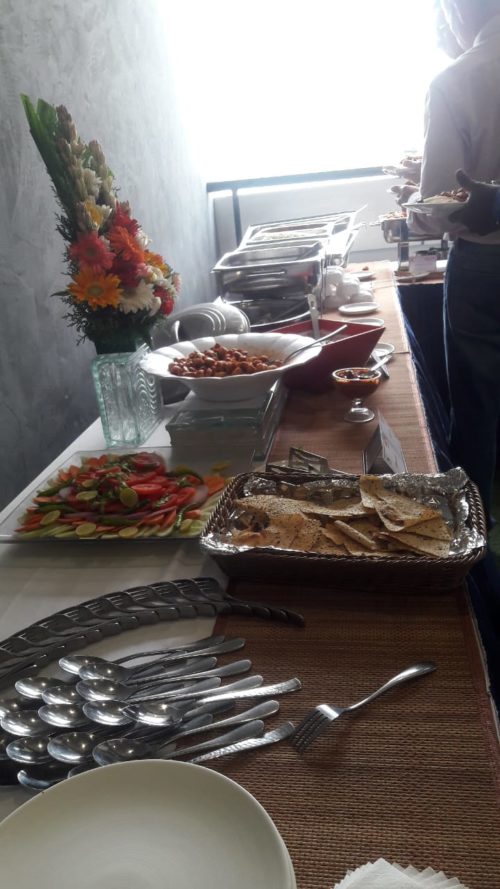Want a Plastic-Free Boardroom? This Woman’s Fight Will Teach You The Right Lessons
Sujata says that unless and until any of their guests explicitly mentioned needing a plastic mineral water bottle, they stuck to the glass bottles for serving water.

If you are on Twitter, you probably know that Anand Mahindra, the Chairman of Mahindra Group, is extremely active on the social networking site.
So, when a twitter user, Mitali (@filmibaaz), in reaction to a picture posted by Mahindra on twitter, urged him to consider using steel bottles rather than plastic bottles, he decided to put a ban on the usage of plastic water bottles in all his boardrooms.
I think the board room should have Steel Bottle instead of Plastic bottle.. Just an observation sir ?
— Mitali (@filmibaaz) July 16, 2019
Additionally, he also responded to her.
Yes, plastic bottles will be banished. We were all embarrassed to see them that day… https://t.co/RwZA4tWoRE
— anand mahindra (@anandmahindra) July 16, 2019

Mahindra has over 7 million followers on Twitter, and in doing this, he has set the tone for others to learn from.
With all the steps you are taking towards leading a sustainable life, do consider using these environmentally friendly cotton canvas laptop messenger bags as well. You can buy them here.
While this happened in Mumbai, Sujata Nanda, a Senior Product Manager at a US-based MNC in Bengaluru did something rather unique when a group of international delegates and clients visited the office recently.
The reason why this is of interest to The Better India is that it shows how even a small step that you take can cause a big change, and ensure that the environment stays protected for a longer time.
So, what did Sujata do?
The general perception in India is that international clients and delegates need to be given bottled mineral water because they might fall sick if they drink regular water.
This is the first perception that Sujata chose to challenge.
She says, “While we understand that our international guests can be sensitive to the water they get outside their own country, the idea was to reduce and if possible conduct a zero-plastic event. While we ensured that we provided them with the best possible water, we did not resort to using any plastic bottles. We used glassware instead.”
Sujata says that unless and until any of their guests explicitly mentioned needing a plastic mineral water bottle, they stuck to the glass bottles for serving water.
“It was us, at the organisation, who seemed apprehensive about the whole thing. Our guests, on the other hand, were extremely appreciative of this move,” she says.
She goes on to speak about how small changes they made at this one instance has led to such a positive change.
Pre-packaged food versus a buffet

The general practice in most of these networking lunches is to organise pre-packed food boxes, and these are most certainly not environmentally friendly, says Sujata.
She says, “We tried to change this, and this year we organised a buffet lunch for the guests and ensured that no food went waste. In the pre-packed boxes, there is usually a lot of wastage, and one cannot even give it to anyone else because it has been used. In the case of the buffet, we were also able to manage the food wastage effectively.”
In addition to curbing the usage of plastic, the organisation also made other tweaks. They ensured that only one car was being used to ferry the guests to and fro during their stay in Bengaluru. They also did not print out any important documents; everything was sent digitally.”
When asked if this was the first time something like this was being tried at the office, Sujata responded in the affirmative.
Usually, during meetings, printouts and papers get wasted, and this move by Sujata helped considerably in curtailing that. Sujata does specify that the company already has a policy which limits the number of printouts that one can take, so this move only furthered the cause.
“While we have a group called Haritha within the organisation working towards using better practices around the office, there was always a push-back saying we cannot do this when we have international guests and delegates visiting.” In pulling off the two-day event successfully, Sujata has now managed to convince other departments within her organisation to try and follow suit.
When asked how difficult it was to change mindsets, she says, “The challenge was to help the facilities team understand why the glass bottles and tumblers needed to replace the usual plastic mineral water bottles. In fact, the office boys as a matter of practice were all ready to enter with the plastic bottles. After the success of this effort, appreciation has been pouring in from all departments.”
She adds that an email detailing the above steps was circulated post the event, with the hope that others adopt them and continue the excellent work.
In an organisation with more than 800 people, what Sujata has done has set the tone, she has ensured that her actions speak louder than words.
Here’s hoping that this has an impact that goes well beyond her colleagues to all of our organisations as well!
While Sujata managed to make these changes in her own company, here’s how you can make a difference in yours.
1. Start by carrying your own eco-friendly sustainable water bottle to work. You can always refill it at work through the day. Some options you could consider buying can be found here.
2. The next step could be to reduce the amount of paper that is used in your office. Using recycled paper is one way to go about it, also try and minimise printing documents. You could look at buying handmade paper note pads here.
3. If you order in a lot at your workplace try and find places that encourage the use of biodegradable containers or better still places that allow you to have the food delivered in your own container. Also remember that you can opt to not receive any cutlery with your food, on most delivery apps. This will also help to reduce plastic usage.
4. Refrain from getting printouts. You can always use send across documents and other correspondence, digitally. If you do have to take printouts ensure that you utilise used sheets.
5. Switch to using bar soaps rather than the plastic pump ones. With each use the bar soap cleanses itself; so do not worry about germs on it. What you ought to worry about is the plastic pump, which is perhaps attracting more germs that you know. Some options for you to consider can be found here.
We do hope that making the switch with these pointers proves to be helpful. We’d love to hear from you if you decide to act on any of these.
(Edited by Gayatri Mishra)
Like this story? Or have something to share?
Write to us: [email protected]
Connect with us on Facebook and Twitter.
If you found our stories insightful, informative, or even just enjoyable, we invite you to consider making a voluntary payment to support the work we do at The Better India. Your contribution helps us continue producing quality content that educates, inspires, and drives positive change.
Choose one of the payment options below for your contribution-
By paying for the stories you value, you directly contribute to sustaining our efforts focused on making a difference in the world. Together, let’s ensure that impactful stories continue to be told and shared, enriching lives and communities alike.
Thank you for your support. Here are some frequently asked questions you might find helpful to know why you are contributing?


This story made me
-
97
-
121
-
89
-
167











